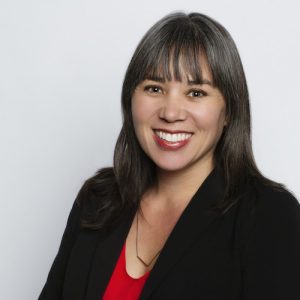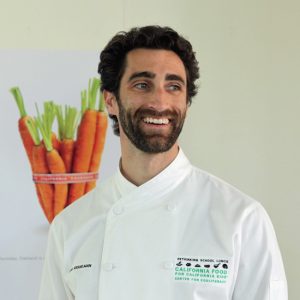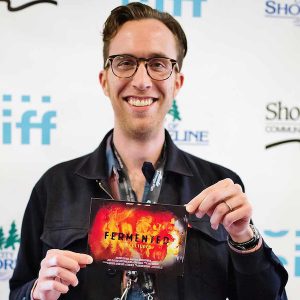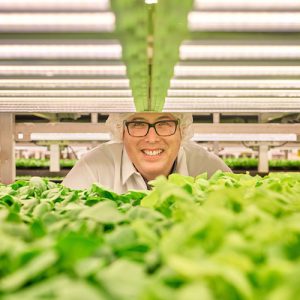Ep. 75: Teresa Ish, Program Officer of the Environment @ The Walton Family Foundation ||
On Sourcing Matters episode 75 we welcome Teresa Ish – Oceans Initiative Program Officer at The Walton Family Foundation. Ish manages grants in the Environment Program that leverage the power of the supply chain to advocate for more sustainable fisheries.
Weeks prior to recording I had the opportunity to meet with Ish at the Seafood Expo North America (SENA) in Boston. Teresa provided a walking tour of the SENA floor – introducing us to three change agents in the future of fisheries:
- Casey Marion – the Director of Sustainability Initiatives for Quality Management for Florida based Sea Best. Casey shared with us some of the systems they’ve introduced to better understand sophisticated supply chains in global fisheries.
- Mauricio Orellana – a leader in the Octopus fishery on the Yucatán Peninsula in Mexico. We learn first hand about this unique example of a future responsible fishery built to service its community of fisherman through first appreciating its resources. – We also learn a bit more about the soul of an Octopus.
- Our final stop was in my native New England waters. We learn from Richard Stavis – of the iconic brand, Stavis Seafood; Luke Holden – founder of Luke’s Lobster; Dick Jones of Ocean Outcomes, and Sean Murphy of Sustainable Fisheries Partnership. This gathering was focused on trends in fisheries and seafood sourcing – on advancements which are better meshing with modern consumer interests.
TuneIn to hear what a leading foundation
is doing to protect our seas; our future!
 BIO: Before joining the foundation, Teresa Ish was the seafood project manager for the Corporate Partnerships Program at Environmental Defense Fund, where she worked with leading seafood buyers to develop and implement sustainable seafood purchasing policies. During her tenure at EDF, she played an instrumental role in merging the organization’s seafood buyer work and its extensive experience in the fishery policy arena. Prior to joining EDF, she co- founded FishWise and served as its director of science.
BIO: Before joining the foundation, Teresa Ish was the seafood project manager for the Corporate Partnerships Program at Environmental Defense Fund, where she worked with leading seafood buyers to develop and implement sustainable seafood purchasing policies. During her tenure at EDF, she played an instrumental role in merging the organization’s seafood buyer work and its extensive experience in the fishery policy arena. Prior to joining EDF, she co- founded FishWise and served as its director of science.–


 With three consecutive James Beard nods, Kris Komori is the rock star of Idaho’s chef world. A graduate of the College of Idaho, he sharpened his kitchen skills in Portland before moving to the Gem State. Komori’s creative, constantly changing menus drew fast admiration when State & Lemp opened in 2013. Most recently, he and his team have been developing a new concept and restaurant that will launch in downtown Boise soon.
With three consecutive James Beard nods, Kris Komori is the rock star of Idaho’s chef world. A graduate of the College of Idaho, he sharpened his kitchen skills in Portland before moving to the Gem State. Komori’s creative, constantly changing menus drew fast admiration when State & Lemp opened in 2013. Most recently, he and his team have been developing a new concept and restaurant that will launch in downtown Boise soon. Kesselman’s programs encourage schools to teach and model education for sustainable living – beginning with a good diet. The students that Adam and Vince work with have an opportunity to experience and understand how nature sustains life and how to live accordingly. One such program – California Thursdays – now servers over 334 million school meals a year, which accounts for 33% of the school meals in California. Every meal serves California-grown, for California kids – and of which has focus on food quality and integrity from the source. Economists estimate that every dollar spent on local food can generate up to an additional $1.40 in spending, supporting local economies. So, built upon that – what’s it worth to any of us to provide our kids and our neighbor’s kids preventative healthcare and good consumption habits – things that tend to carry-on for a lifetime.
Kesselman’s programs encourage schools to teach and model education for sustainable living – beginning with a good diet. The students that Adam and Vince work with have an opportunity to experience and understand how nature sustains life and how to live accordingly. One such program – California Thursdays – now servers over 334 million school meals a year, which accounts for 33% of the school meals in California. Every meal serves California-grown, for California kids – and of which has focus on food quality and integrity from the source. Economists estimate that every dollar spent on local food can generate up to an additional $1.40 in spending, supporting local economies. So, built upon that – what’s it worth to any of us to provide our kids and our neighbor’s kids preventative healthcare and good consumption habits – things that tend to carry-on for a lifetime. From episodes of Anthony Bourdain’s “Parts Unknown” and the PBS & Netflix program – “Mind of a Chef” – Cianfrani has been worked as a producer, director and editor for New York City – based – Zero-Point-Zero (ZPZ) production. Most recently, Jon directed the feature documentary titled “Fermented” which is scheduled to air online in April 2019. Hosted by Chef Edward Lee, the film poses the question: “What is Fermentation?” to chefs and artisans on the west coast, Chicago, and rural Japan.
From episodes of Anthony Bourdain’s “Parts Unknown” and the PBS & Netflix program – “Mind of a Chef” – Cianfrani has been worked as a producer, director and editor for New York City – based – Zero-Point-Zero (ZPZ) production. Most recently, Jon directed the feature documentary titled “Fermented” which is scheduled to air online in April 2019. Hosted by Chef Edward Lee, the film poses the question: “What is Fermentation?” to chefs and artisans on the west coast, Chicago, and rural Japan. AeroFarms is a leading clean-technology champion, building and operating state-of-the art indoor vertical farms in major cities around the world. Helping set new culinary standards for freshness and flavor, AeroFarms has been recognized as a Global Cleantech 100, Inc.com’s Top 25 Disruptive Companies, Winner of the World Technology Award for Most Impactful Environmental Company, and Finalist for The Circular Awards of The World Economic Forum.
AeroFarms is a leading clean-technology champion, building and operating state-of-the art indoor vertical farms in major cities around the world. Helping set new culinary standards for freshness and flavor, AeroFarms has been recognized as a Global Cleantech 100, Inc.com’s Top 25 Disruptive Companies, Winner of the World Technology Award for Most Impactful Environmental Company, and Finalist for The Circular Awards of The World Economic Forum.